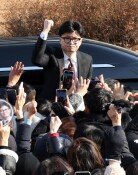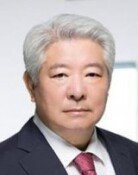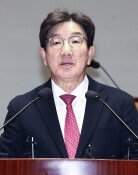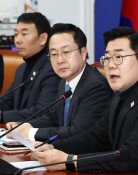People Power Party engulfed in severe internal conflict
People Power Party engulfed in severe internal conflict
Posted December. 17, 2024 07:43,
Updated December. 17, 2024 07:43
The People Power Party has been thrown into severe internal turmoil following the passage of the impeachment bill against South Korean President Yoon Suk Yeol. Although the party’s leader, Han Dong-hoon, initially showed no intention of stepping down immediately after the impeachment bill passed, he resigned on Monday after all five elected members of the Supreme Council announced their resignations, leaving him unable to hold on any longer. This marks the ruling party's fifth emergency response committee system since the current administration began. However, tensions between the pro-impeachment and anti-impeachment factions have peaked, with the party on the verge of splitting.
The general assembly held on Saturday, right after the impeachment bill passed, starkly revealed the disarray within the fractured ruling party. The closed-door assembly, which began without Han, turned into a venue for denouncing him, with shouts of “traitor” and “selfish” filling the room. Some lawmakers banged their fists on tables, yelling, “Call Han in here now.” When Han entered midway, he retorted, “Impeachment was necessary,” and argued, “Did I vote for the impeachment bill? Did I declare martial law?” This escalated tensions, with some lawmakers reportedly rushing to the podium, pointing fingers, and even throwing water bottles.
Lawmakers who opposed the impeachment accused the pro-impeachment faction of being traitors and vowed they could no longer work together in the same party. Meanwhile, Han’s allies counterattacked by claiming that “those who supported martial law are the real collaborators in treason,” pushing the conflict to an irreconcilable level. Such scenes make it questionable whether ruling party lawmakers are genuinely concerned about the current national crisis. The ruling party, which had long defended the president’s policy failures, should bear collective responsibility. However, instead of showing contrition, most lawmakers remain silent about how the martial law was wrong. As one politician cynically remarked, are they clinging to the belief that voters will forget everything after a year?
The lawmakers who opposed impeachment seem eager to avoid being framed as traitors. Instead, they repeatedly invoke “loyalty to the president,” an anachronistic justification. While some attribute a series of losses in presidential, local, and general elections following the impeachment of former President Park to their pro-impeachment stance, the true cause of such losses was their failure to reform the party, not their stance on impeachment. Despite pointing out the problems with martial law, Han failed to change the party’s trajectory. Instead, he wasted energy on minor issues like party forums and missed opportunities to demonstrate political leadership.
In the coming days, the ongoing investigation of the sitting president, possible arrest warrants, and the Constitutional Court’s impeachment review will take place simultaneously. This is precisely when the ruling party should return to the political fundamentals of following public opinion and common sense. The persistent ignorance of lessons from electoral defeats is baffling.
Headline News
- Constitutional Court to hold first hearing on Pres. Yoon’s impeachment
- Han Dong-hoon steps down as People Power Party leader
- International hunt to find assets of former Syrian Pres. Assad
- Samsung Lions invest 10.2 billion won in free agent market
- Constitutional Court should resolve the nation’s uncertainty







